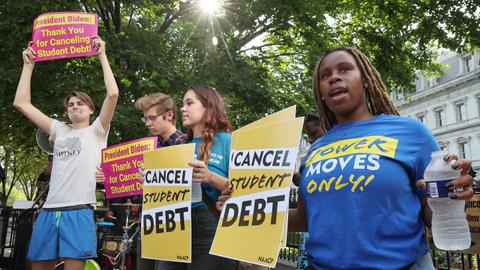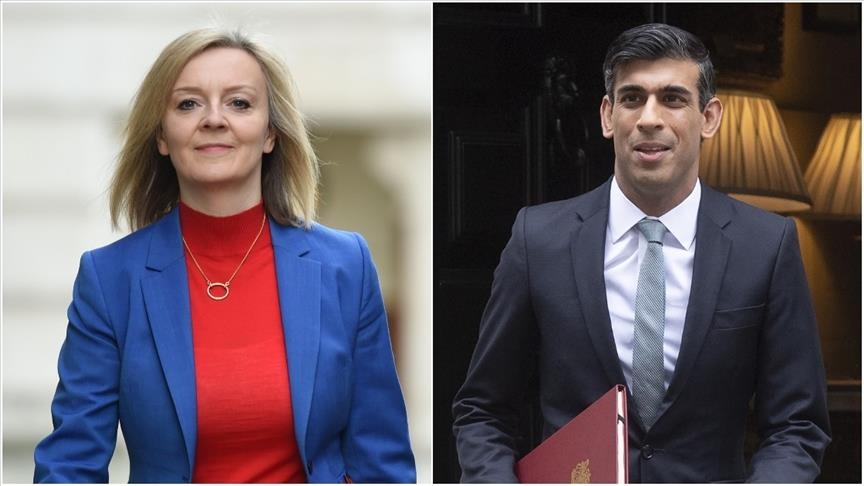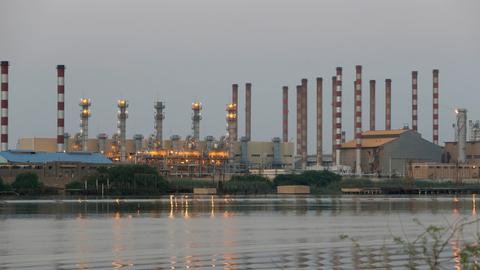LONDON
Members of Britain’s ruling Conservative Party are currently voting to decide on their next leader, who will also become the next prime minister.
Former Chancellor of the Exchequer Rishi Sunak is facing off against Foreign Secretary Liz Truss. The race was triggered by Prime Minister Boris Johnson’s resignation following a series of scandals that critics said cast doubt on his integrity and suitability for office.
Truss is leading in internal Conservative Party membership polls by some margin, though Sunak led in the first stage of the contest with Conservative Party lawmakers.
Anadolu Agency interviewed three experts on British politics for their views on the leadership race.
Establishment politics
Michael Kandiah, a lecturer in Contemporary British History at King’s College London, told Anadolu Agency that it was “more than likely” that Truss will become prime minister.
He said Sunak had not made his case to the Conservative rank-and-file as effectively as Truss had.
“He’s much more the establishment candidate,” he added, pointing to the “increasing divide” between the Conservative parliamentary party and the grassroots.
Roger Mortimore, a professor of Public Opinion and Political Analysis at King’s College London, told Anadolu Agency that while Truss had the advantage as things stand, either candidate could still win.
“This is a politically-sophisticated electorate who will take account of the arguments they hear and of the impressions that the candidates are giving, and it is not too late for Rishi Sunak to catch up if he should prove more convincing over the next couple of weeks,” he said.
Mortimore said Truss’ advantage lied in her proposed policy of cutting taxes, and in that Sunak was blamed for Johnson’s resignation.
He said that Sunak’s best hope lied in his economic case that now is the wrong time to cut taxes due to rising inflation.
He added that all credible candidates were inevitably part of the party establishment, as there was “no substantial dissident faction in the party with a different policy agenda.”
Johnson’s shadow
Johnson’s shadow looms large over the leadership race, and Kandiah agreed that a major issue facing Sunak is his perceived role in toppling Johnson, as well as his perceived arrogance by some.
Kandiah added that while the parliamentary party was largely unwilling to let sleeping dogs lie – they were the ones to force him from office after all – the party rank-and-file saw the outrage over Partygate as being led more by the media than the wider electorate, as well as seeing a large dose of hypocrisy.
“What they would have much preferred is that they could have voted him out,” Kandiah said. “I think that’s really where the problem lies.”
Truss has aligned herself closely with Johnson, while Sunak has made clearer his ethical and economic disagreements with the prime minister.
Mortimore said that Johnson was dislodged because of “personal and leadership” issues rather than policy ones.
Conservative members “would not have pushed him out if he had not been damaging the reputation of the party and the government with personal failures and misjudgments,” he said.
End of an era?
“A week’s a long time in politics,” Kandiah said, as he began exploring the issue of whether a simple change in leadership would be enough to give the Conservatives a fighting chance of winning the next general election, which has to take place by 2024.
He was not particularly sanguine. Johnson was handed his enormous majority in 2019 by so-called Red Wall voters, former Labour voters who backed Brexit in 2016 and then Johnson three years later. Though they are older and more socially conservative, like the Conservatives’ core affluent voters, they are also to the left economically owing to their living in more deprived parts of the country.
“It’s very difficult to see them coming back for a whole variety of reasons,” Kandiah said.
Red Wall voters are among the most hard-hit by a wave of problems plaguing the government, not least the skyrocketing cost-of-living-crisis and surge in energy bills. Immigration is also a consistent concern for all Conservative voters.
“If voters are able to see that they’ve been able to do something genuine about it, that might change,” Kandiah said. “The problem really is I don’t see that happening. It’s very difficult to see another leader, simply a new face, changing the results in the medium-term, which is really what the next general election is.”
Mortimore said it all hinges on how the new leader performs until the next election.
Labour may be ahead in the polls, but their victory is not a foregone conclusion, he said, because other governments in the past have recovered from similar deficits in the polls. The key issue would most likely be the country’s economic recovery.
“The new leader has to find a way of keeping both those groups happy, or of conjuring up millions of new supporters to replace the ones who are unhappy and won’t vote Conservative again. If he or she can’t do that, they will be entirely dependent on hoping that Labour will be incompetent enough to miss an open goal,” Mortimore said.
Race and gender
The makeup of the leadership race has drawn widespread media interest, as one candidate is an ethnic minority and the other a woman. The left often sees itself as more progressive on issues of racial and gender justice than the right.
“It was always assumed that the left would be a place where racial minorities would feel more comfortable,” Kandiah said.
He added that there is a growing divide within Britain’s various ethnic minority groups, with South Asians for example beginning to be drawn more to the Conservatives than Labour.
“Even within the broader Conservative Party itself, race is not seen to be an issue,” Kandiah said. “They’ve done plenty of opinion polling of ordinary Conservative voters, and they don’t see this as a big issue. What’s also very interesting about having a woman (is that) because they’ve had two prime ministers who were women in the past, that is not seen to be a problem. So it’s not that it’s an advantage, it’s not a problem.”
“It’s an interesting social development and it’s an interesting historical development,” he said.
Mortimore said that gender was no issue in the election as “Margaret Thatcher is still widely revered by party members.”
He added that race was not an issue either.
“Certainly until a few years ago, it would have been very surprising to see a member of an ethnic minority being seriously considered as a Conservative leader, but I don’t think that is true anymore,” he said.
He continued by saying that the last few Conservative governments had more ethnic minority ministers than any previous government of any party and that Conservative members do “now seem to be comfortable with that.” Sunak himself was a very popular Chancellor until events led to his poll ratings falling, he added.
“If he loses, I’m sure it will not be because Truss is white and he is not,” Mortimore said.
Emilia Belknap, a PhD candidate in gender and politics at the University of Edinburgh, also discussed the racial and gender makeup of the Conservative leadership race with Anadolu Agency.
Belknap said that both previous women prime ministers have been Conservative, a fact used by them to “substantiate their mission for gender equality within the party.”
She added, however, that these claims come into question in terms of policy measures and the treatment of women candidates within the party, such as with maternity leave.
“If Liz Truss wins the competition, she will be the country’s third Tory (Conservative) British prime minister. If Rishi Sunak wins, he will be the UK’s first person of color standing in the premiership,” Belknap said.
Citing academic research in this field, she highlighted the difference between substantive and descriptive representation.
“In the context of the Tory leadership race, while Truss and Sunak both are members of minority groups in politics, it is crucial to place more importance on what they do for the groups they are a part of (women or people of color) as opposed to only giving recognition to what they look like. It is important that political leaders are substantive in terms of equality,” she said.
The new leader of the Conservative Party, and in turn prime minister, will be announced on Sept. 5.
Anadolu Agency website contains only a portion of the news stories offered to subscribers in the AA News Broadcasting System (HAS), and in summarized form. Please contact us for subscription options.





